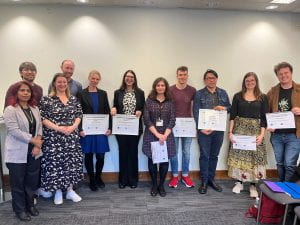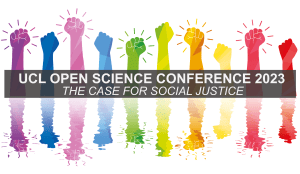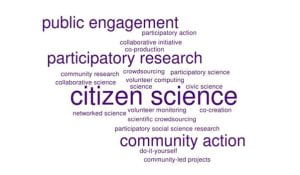OOSS Annual Recap 2023
By Rafael, on 17 January 2024
As we step into a new year, let’s reflect on the collective achievements and milestones of the UCL Office for Open Science & Scholarship (OOSS) and our associated teams in 2023. This year witnessed the growth and integration of OOSS within the institutional culture of UCL, offering pivotal support to academic staff, researchers, and students. From the successful return to in-person events with our annual conference to pioneering initiatives and awards, let’s revisit the highlights that shaped our work last year!
Annual Conference & Open Access Celebrations
In April 2023, we successfully organized our annual conference, marking our first return to in-person events. Themed Open Science and the Case for Social Justice, the conference fostered important discussions on sustainability in research practices, addressing critical issues such as gender, language, authorship, and geographical disparities. Recordings of these insightful discussions are available. Notably, a workshop during the conference addressed equity in authorship, contributing to a forthcoming UCL statement on Authorship. Additionally, October saw the celebration of our Open Access week, themed Community over Commercialisation. This included a series of blog posts, activities, and discussions, emphasizing equitable access to a wide range of works.
Honouring Excellence: Inaugural Open Science and Scholarship Awards:
Another highlight was the inaugural Open Science and Scholarship Awards at UCL in collaboration with the UK Reproducibility Network. These awards aimed to recognize and celebrate the efforts of UCL students and staff who champion open science practices. Learn more about the winners and their innovative work!
Open Access: Profiles & Transformative Agreements
The Open Access Team played a pivotal role in ensuring the open availability of UCL academics’ research outputs throughout 2023. A major achievement was the successful introduction of the new Profiles platform, replacing the outdated IRIS. Profiles acts as UCL’s public search and discovery tool, significantly improving the visibility of academic profiles, publication lists, research and teaching activities, and collaborations with UCL colleagues. The team also facilitated the Gold open access publication of 3,383 papers in 2023, contributing to the thriving UCL Discovery with over 44 million downloads. The repository now boasts over 166,000 open access items, including 23,400 theses, with over 18,500 uploads in the preceding twelve months.
Aligned with the UKRI and Wellcome open access policies, the Open Access Team provided robust support for UCL researchers. This included facilitating compliance through publishing in fully open access journals, making use of transformative agreements with publishers encompassing over 12,000 journals, and using funders’ language to secure the right to make accepted manuscripts freely accessible upon publication under the CC BY license.
Research Data: Enhancing Support to Researchers
The Research Data team introduced a more user-friendly version of the UCL Research Data Repository, incorporating enhanced features and a comprehensive user manual. The repository saw a significant influx of 193 new items, including data sets, media items, and software applications. Engaging with researchers, the team provided substantial assistance, reviewing 32 data management plans and conducting successful training sessions for 61 researchers. Additionally, the team expanded and refined frequently asked questions (FAQs) for better user support.
Citizen Science: New website and initiatives
The Citizen Science Team expanded its reach and impact in 2023 through new Citizen Science website pages and an enhanced list of citizen science projects at UCL, fostering a greater understanding of the breadth of such initiatives across the university. The creation of a unifying definition of citizen science at UCL, accompanied by an inclusive word cloud, provided clarity on the diverse subject areas and disciplines covered by citizen science projects.
The development of the UCL Citizen Science Certificate, in collaboration with the UCL Citizen Science Academy, marked a significant milestone and underscored our commitment to fostering collaborative initiatives. A new Citizen Science community on MS Teams was launched, providing a dedicated space for discussions and updates. Get involved!
Bibliometrics: Measuring Research Impact
The Bibliometrics Team, in collaboration with the Open Access Team, played a crucial role in implementing the new Profiles system. Their research confirmed the citation advantage associated with open access practices. After a detailed analysis of UCL publications over recent years, the study demonstrated that open access materials are utilised and cited more extensively, and confirmed the place of the institution as leading organisation in making material available in open access.
Additionally, the team introduced new courses, including an introduction to altmetrics and the Overton database, aiming to assess the broader impact of published research in the wider world and cover policy documents and official documents. Another training provided an overview of understanding and demonstrating research impact, further supporting UCL’s researchers. The Bibliometrics Team’s dedication to understanding and demonstrating research impact through various courses and collaborations reinforced UCL’s position as a leader in research output accessibility.
Stay connected and Informed

The combined efforts of OOSS teams in 2023 exemplify UCL’s commitment to open and accessible research practices across diverse disciplines. As we move forward, the OOSS remains dedicated to fostering an inclusive culture of open science and scholarship, shaping a transformative academic environment at UCL.
Join us in 2024 for updates and insights, and follow us on X, formerly Twitter, to find out more about open science and scholarship at UCL!
 Close
Close





